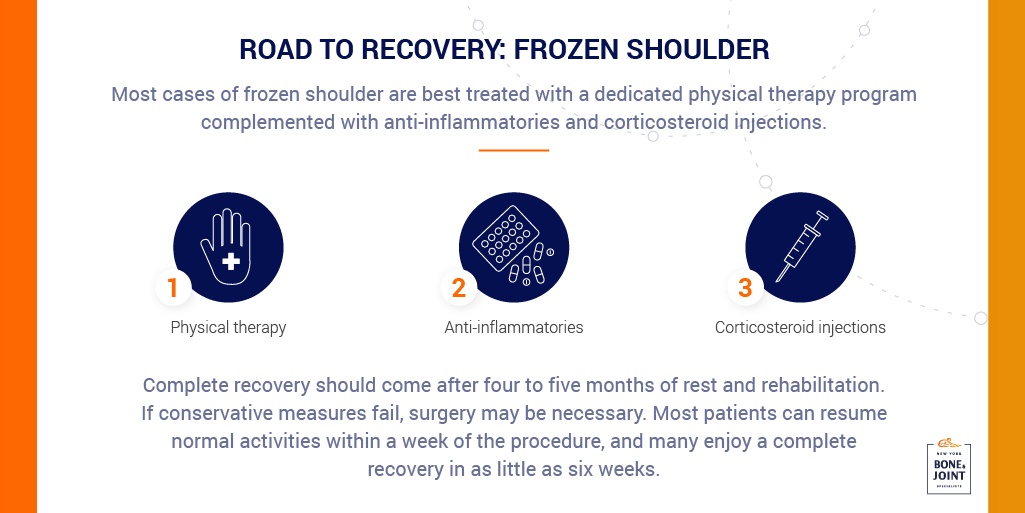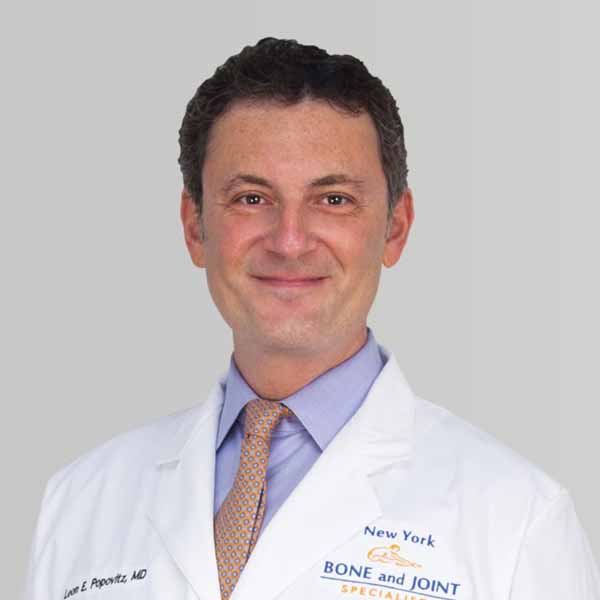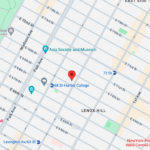WHAT IS FROZEN SHOULDER?
Adhesive capsulitis, often referred to as frozen shoulder, is an inflammation of the shoulder capsule (the band of connective tissue that encases the shoulder joint) While it may progress quite slowly, the condition eventually results in a greatly restricted range of motion and an overwhelming sense of stiffness in the affected shoulder.
FROZEN SHOULDER SYMPTOMS
Symptoms of frozen shoulder tend to develop gradually. The most common include:
- Moderate to severe pain and inflammation
- Persistent stiffness in the affected shoulder
- A significantly limited range of motion
FROZEN SHOULDER CAUSES
While many conditions seem to encourage its development, the precise cause of frozen shoulder is still unknown. Diabetes, a thyroid disorder, and past surgeries involving the shoulder or the chest all seem to increase the likelihood of developing frozen shoulder, along with any condition that might prompt the patient to immobilize the joint.
FROZEN SHOULDER STAGES
Frozen shoulder manifests itself in several stages:
The first, the “freezing” phase, is defined by increasingly severe pain in the shoulder. It can last for as little as several weeks or as long as nine months.
The second, the “frozen” phase, is defined by a gradually subsiding pain and lingering stiffness. It can last anywhere from four to nine months.
The final, the “thawing” phase, is defined by continued abatement of pain and slow improvement in the shoulder’s range of motion. The length of this phase varies greatly, from as few as five up to 26 months.
FROZEN SHOULDER TREATMENT
Treatments for frozen shoulder are usually conservative, but in a handful of cases, a short arthroscopic surgery may be necessary to completely restore the patient’s range of motion. The ultimate course of treatment depends on the severity of the condition.
Conservative

Most patients with frozen shoulder respond best to a dedicated physical therapy regimen, which will restore the shoulder’s range of motion and develop the muscles and ligaments surrounding it. You will likely need to follow this rehabilitation plan for four to five months to ensure a complete recovery. If necessary, anti-inflammatories and corticosteroid injections can alleviate inflammation, allowing you to continue your stretching and strengthening exercises without impediment.
Surgery
If you continue to suffer from a limited range of motion after more conservative treatments, frozen shoulder can be treated with arthroscopic surgery. During the procedure, your surgeon will break up and remove any pieces of scar tissue in the shoulder. As a minimally invasive procedure, the operation results in fewer complications and a shortened recovery time, with most patients able to resume normal activities within a week and many enjoying a complete recovery in as little as six weeks.
_________________________________
EXPERIENCING PAIN? DO YOU HAVE AN INJURY?
Our Specialists are here to help.
Book an appointment with NYC’s best orthopedic specialists to discuss your condition. Fill out the form below and you will receive a call from our office within 5-10 minutes. We’ll book an appointment at a time and location that work for you, and send you a reminder by email.
Frozen Shoulder: FAQs
What is frozen shoulder (adhesive capsulitis), and what causes it?
Frozen shoulder is a condition where the shoulder joint capsule stiffens and inflames, limiting motion and causing pain. The exact cause isn’t always clear. Risk factors include prolonged immobility (after injury or surgery), diabetes, thyroid disorders, age (most common between 40-60), and sometimes previous shoulder injury.
What are the stages of frozen shoulder, and how long does each last?
There are 3 (sometimes 4) stages:
-
Freezing (pain gradually increases, motion becomes limited) — lasts from a few weeks up to ~9 months.
-
Frozen (pain may improve, but stiffness remains, motion is significantly reduced) — often 4 to 12 months.
-
Thawing / Recovery (gradual improvement in motion, less pain) — this stage can last several months up to 1-2 years or more depending on severity and treatment. Full recovery often takes 1-3 years.
How is frozen shoulder diagnosed, and what should I expect in the evaluation?
Diagnosis generally involves a medical history and physical exam, looking at range of motion (both passive and active), pain with certain movements, and whether the capsule is tight. Imaging (X-rays) is used to rule out other issues (like arthritis or rotator cuff tear); MRI or ultrasound may help in uncertain cases.
What are common treatments, and which ones help speed up recovery?
Treatments range from non-surgical to surgical, depending on stage & severity:
-
Non-surgical options: oral NSAIDs, steroids (injection), physical therapy with stretching / range-of-motion exercises, heat or ice, home exercise programs.
-
Procedures: hydrodilatation (injecting fluid to stretch the capsule), manipulation under anesthesia, or arthroscopic capsular release if non-operative measures fail to produce sufficient improvement.
-
Outlook: Many people get significant relief over time, though stiffness can linger. Compliance with therapy, early treatment, and addressing risk factors (e.g. controlling diabetes, avoiding prolonged immobilization) help shorten recovery.












